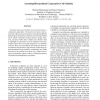Free Online Productivity Tools
i2Speak
i2Symbol
i2OCR
iTex2Img
iWeb2Print
iWeb2Shot
i2Type
iPdf2Split
iPdf2Merge
i2Bopomofo
i2Arabic
i2Style
i2Image
i2PDF
iLatex2Rtf
Sci2ools
ICTAI
2007
IEEE
2007
IEEE
Assessing Hierarchical Cooperative CoEvolution
Recently, many research efforts are directed towards coevolutionary algorithms. The present work aims at the assessment of Hierarchical Cooperative CoEvolution (HCCE) being properly formulated to address hierarchical problems where simple components having separate design objectives, are parts of other more complex ones. HCCE is able to highlight the specialties of each component and additionally enforce their successful integration in a composite structure. Here we present HCCE describing also the internal dynamics that provide its effectiveness in addressing difficult distributed design problems. Additionally, the results described in the present work attest to its validity and superior performance against ordinary Unimodal evolution, and Enforced SubPopulation coevolution.
Artificial Intelligence | Hierarchical Cooperative CoEvolution | ICTAI 2007 | Present Work | Present Work Attest |
| Added | 03 Jun 2010 |
| Updated | 03 Jun 2010 |
| Type | Conference |
| Year | 2007 |
| Where | ICTAI |
| Authors | Michail Maniadakis, Panos E. Trahanias |
Comments (0)

